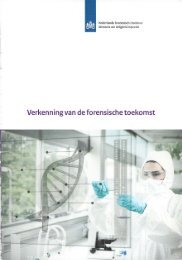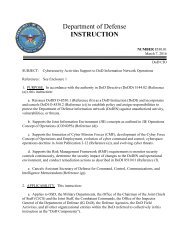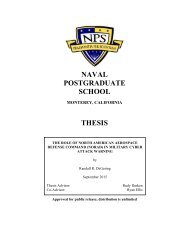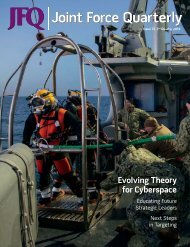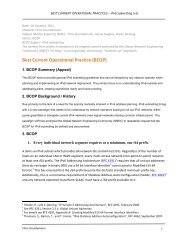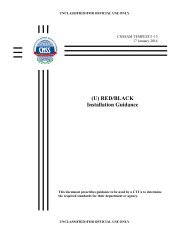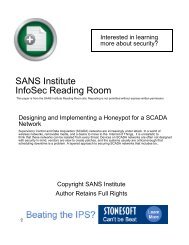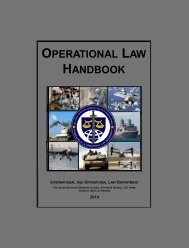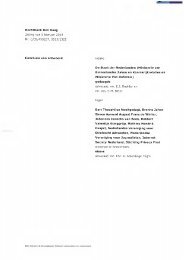jko-catalog-sep-2012
jko-catalog-sep-2012
jko-catalog-sep-2012
You also want an ePaper? Increase the reach of your titles
YUMPU automatically turns print PDFs into web optimized ePapers that Google loves.
JKO Course Descriptions<br />
course illustrates why users should always be on the look out for phishing attempts, even from people from within their organization.<br />
0.5 hour(s)<br />
Planning (HOA 11) Course J3OP-US876 N,S<br />
The purpose of this course is to train Individual Augmentees (IAs) assigned to the CJTF-HOA staff who were unable to participate<br />
in the formal in-house training at JWFC as part of the core staff. The student will become familiar with aspects of the Joint<br />
Operation Planning Process. At the conclusion of the course, the student will: understand that planning is Commander-centric;<br />
understand the environment and frame the problem prior to attempting to solve it; recognize the need to spend time organizing<br />
the headquarters for planning; understand roles and considerations in planning; recognize that assessment drives planning;<br />
and understand the importance of including stakeholders in the planning process. This course is derived from the US<br />
Joint Forces Command/Joint Warfighting Center (JWFC) Deployable Training Team academic training seminars presented to<br />
the incoming CJTF-HOA staff during the Academics phase of the Mission Rehearsal Exercise, December 2010. 1 hour(s)<br />
Planning (RCS 11) Course J3OP-US1110* N,S<br />
The purpose of this course is to train Individual Augmentees (IAs) assigned to the Combined Joint Task Force-82 (CJTF-82) and<br />
International Security Assistance Force (ISAF) Regional Command-South (RC-South) staff who were unable to participate in the<br />
formal training seminars presented to the core staff. The student will become familiar with planning issues associated with a<br />
JTF and aspects of the Joint Operation Planning Process. At the conclusion of the course, the student will: understand that<br />
planning is commander-centric; understand the environment and frame the problem prior to attempting to solve it; recognize<br />
the need to spend time organizing the headquarters for planning; understand that assessment drives the planning process;<br />
understand that branch and sequel planning helps set conditions for success; and finally, to understand the importance of<br />
including stakeholders in the planning process. This course is derived from the US Joint Forces Command/Joint Warfighting<br />
Center (JWFC) Deployable Training Team academic training seminars presented to the incoming CJTF-82 staff during the Mission<br />
Rehearsal Academics and Exercise, 4-8 April 2011 and 31 May – 3 June 2011. 1 hour(s)<br />
Planning and Execution of UN Peacekeeping J5ST-US133 N<br />
The Planning and Execution of United Nations Peacekeeping Missions course targets all joint combatant command and component<br />
staff members involved in Peacekeeping planning and execution. Completion of this course should result in a working<br />
knowledge of the UN military and integrated planning process, the UN peacekeeping execution structure, and processes and<br />
procedures for developing multi-national rules of engagement and other military force requirements. 8 hour(s)<br />
Police Operational Mentoring and Liaison Teams J3OP-MN900-09-02 N,S<br />
This course is part of a larger ISAF Curriculum. The Police Operational Mentor and Liaison Team (POMLT) programme is a key<br />
contribution by NATO/International Security Assistance Forces (ISAF) toward developing the Afghan National Police (ANP). The<br />
aim of this lesson is to provide an understanding of the POMLT programme and describe its importance to NATO’s overall effort<br />
in Afghanistan. It describes specific roles and responsibilities of POMLTs, organisational structure, Command and Control<br />
relationships, and how POMLTs are expected to increase ANP capability to operate independently and to eventually take the<br />
lead in police operations in Afghanistan. 0.5 hour(s)<br />
Portable Electronic Devices and Removable Storage Media ARNJ7-US008 N<br />
This is a required course dealing with DOD policy concerning portable electronic devices and removable storage media. This<br />
course may require an additional login and password registration. In addition, your course manager may require you to present<br />
a copy of the actual hyperlinked course certificate of completion, so please retain a copy for your own records. 1 hour(s)<br />
Portable Electronic Devices/Removable Storage Media (PED/RSM) Short Course J6SN-US414 N,S<br />
The purpose of this course is to teach users the security risks associated with portable electronic devices (PEDs) and removable<br />
storage media. They will learn about security risks associated with these devices, which types of PEDs and removable media<br />
are of greatest concern to the DoD, and what must be done to mitigate security risks to data stored on these devices. Finally,<br />
users will be introduced to DoD policy regarding encryption of data on these devices. 0.5 hour(s)<br />
Post-Deployment Intelligence Course SOCOM-US668 N<br />
The purpose of this course is to provide to meet the DoD annual requirement for post-deployment intelligence training.<br />
0.5 hour(s)<br />
Power and Privilege (EOA) Course J1SN-US461-LB N<br />
The purpose of this course is to demonstrate to learners that power and its associated privilege can sometimes create exclusive<br />
work environments at the expense of others, and that power and privilege can also make it possible for certain groups to<br />
obtain and maintain control over those who have limited power and privilege, which can lead to discriminatory practices. All<br />
* Indicates new courses added to the JKO LCMS after July 2011. The “*” is not a part of the actual course number.<br />
128



